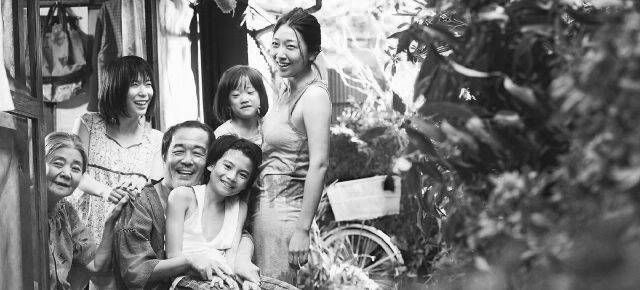Golden Globe Nominee “Shoplifters” Comes to Amherst Cinema

Director Hirokazu Kore-eda’s “Shoplifters,” his newest cinematic plunge into the urban discomforts of contemporary Japan, arrives in Amherst Cinema after its yearlong triumph in the international film festival circuit.
On the surface, Kore-eda’s little tale about a clan of petty thieves meets every assumption regarding the artistic conservatism of these award functions.
For all of the transgressive messages of severing hurtful pasts and choosing your own family, the shoplifters organize themselves into a domestic arrangement that does not differ much from those bound by society: heterosexual “parents” rearing their “children,” whose tenuous bonds are marked with an innocent ignorance.
To reiterate, “Shoplifters” seems to sound the usual notes of a picture of its prestige: kids coming-of-age, socioeconomic deprivation, a loose, near-episodic plot and fixation on the fleeting moments of happiness in the modern world remembered only by the camera, which drops by the ramshackle house with the frequency of a social worker who is reluctantly in on their secret. But within these familiar confines, “Shoplifters” snatches acute whiffs of tremendous pathos and ultimately surpasses its type and hype.
“Shoplifters” swiftly sets up those confines, if only to equally swiftly reach its far more interesting turn. Specifically, its first half, the part of the movie which is included in the promotional materials for the film, deceptively foreshadows a work of straightforward moral provocation.
The most important theft in “Shoplifters” is the rescue of the “daughter” Yuri (Miyu Sasaki) from her actual, abusive family. The thrust of the scene seems simple enough, but from then on, the film dares the viewer to question the morality of Yuri’s artificial family.
Expecting acquiescence, the family renames Yuri as Lin and raises her in their compassionate and criminal image. Lin goes to the beach and picks up a shell, then to the store and picks up chips.
In all things, she is accompanied by some member of her Shibata family, whether it be the charmingly incompetent patriarch Osamu (Lily Franky), the pragmatic pillar of the house Nobuyo (Sakura Ando), the introverted sex worker Aki (Mayu Matsuoka), the kin-weary grandmother Hatsue (Kirin Kiki) or the occasionally jealous but ultimately concerned fake-brother Shota (Kairi Jo). Each Shibata is a formidable personality who appears committed to this absurd performance of family for their selfish agenda. But even their thorniest interactions conclude in love in a happy inevitability, and we, once possible naysayers to this illegal alliance, fill in the wide-eyed blankness of Lin’s face with our own yearning or gratitude.
But there is no happy inevitability after a certain moment in the film, when harsh reality settles in and the Shibatas awake from their collective dream. This framing of the artificial family as a helpless, untenable delusion is in the end what distinguishes “Shoplifters” from the fare of other films like it.
This movie does not pass the tried and true story of little people crushed by big systems as humanistic wisdom or spiritual victory. In so doing, “Shoplifters” demonstrates a special awareness of probable mediocrity, sidestepping towards a far more intriguing territory of provocation.
As Lin is gradually reminded by countless voices of her real name, we are reminded that this fragile theater is bound for closing. To enjoy the film’s moments of happiness, then, becomes a far more daunting task.
These moments are not just an escape from the abuses within the rules, they are failed escapes that wind back to the discontents of lawful society.
A world bound on both ends by ruin, “Shoplifters” could be read as an exceptionally materialist film, whose fatalistic structure underscores the audience’s propensity to attach transcendent, ultimate meaning to our every day.
What matters in the end are blunt, unforgiving social conditions, and without resolving them, any kind of humanistic network is doomed.
Yet there is a softer, perhaps irrational side to the film’s gloomy materialism — one that implores the audience to go to the beach, to enjoy life, to choose one’s own family despite the unavoidable moment of awakening.
But “Shoplifters” does not strut this optimism, and thereby becomes a far more demanding work. The film shifts from delight to disintegration at a breezy pace, and like its main cast, the audience is meant to steal the hope on their own if they wish to escape the nihilism awaiting its end.
When the film ends, we must choose to remember the good times. In short, the scenes of happiness — the family lolling about the beach, feasting on snacks, burning clothes symbolic of a sadder past — all ask for the viewer’s own transgression against the rules that the film itself has established.
To preserve the memory and legitimacy of the Shibata family, it is not enough that we passively behold their frolicking but rather actively remember it, long after the better part of the world has forgotten. “Shoplifters” is very much a film worth watching, if only to be reminded of our responsibility to go beyond mere watching.





Comments ()